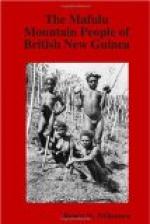The mental attitude and conduct of the people towards ghosts may have originated in some form of ancestor worship, but I found nothing now existing to indicate this; and in particular I could learn nothing of any recognition of, or ceremonial observances with reference to, the individual ghosts of known persons, as distinguished from the ghosts generally.
I could find no direct information as to any belief in ghosts of animals or plants; but the fact that the living edible plants have a ghostly self, upon which the human ghosts feed, seems to involve the idea during the life of those plants; and in that case one sees no reason why the ghost of the plant should not survive the plant itself, just as the ghost of the living person survives him at his death. Also the existence of a ghostly element in human excrement opens out a wide field of ghostly possibilities.
Spirits which have never been human beings are also malevolent; though when we come to the operations of magic men or sorcerers, and to incantations and the use of charms, the powers in connection with all of which appear to be ascribed to spirits, it will be noticed that these are by no means necessarily and invariably engaged or used for malevolent purposes.
I was not able to obtain any satisfactory information as to these spirits, or their supposed attributes, nor, except as regards illness and death, as to the nature of, and ground for, the fears which the natives feel concerning them; indeed, this is a subject upon which most natives all over the world are inclined to be reticent, partly or largely from fear. Even as regards the sacred places which these spirits are supposed to haunt, though the natives are not unwilling to pass them, and will mention the fact that they are sacred, they are unwilling to talk about them. My notes as to spirits, other than those in connection with sorcery producing illness and death, must therefore be practically confined to the sacred places haunted by the spirits, and the demeanour and acts of the natives with reference to, and when they pass, these places.




